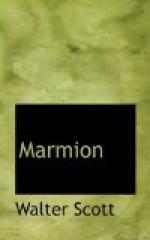line 153. For early influences, see Lockhart’s Life, vol. i.
line 178. ’Smailholm Tower, in Berwickshire, the scene of the author’s infancy, is situated about two miles from Dryburgh Abbey.’- -Lockhart.
line 180. The aged hind was ‘Auld Sandy Ormiston,’ the cow-herd on Sandyknows, Scott’s grandfather’s farm. ’If the child saw him in the morning,’ says Lockhart, ’he could not be satisfied unless the old man would set him astride on his shoulder, and take him to keep him company as he lay watching his charge.’
line 183. strength, stronghold. Cp. Par. Lost, vii. 141:—
’This inaccessible
high strength...
He trusted to
have seiz’d.’
line 194. slights, as pointed out by Mr. Rolfe, was ‘sleights’ in the original, and, as lovers’ stratagems are manifestly referred to, this is the preferable reading. But both spellings occur in this sense.
line 201. The Highlanders displayed such valour at Killiecrankie (1689), and Prestonpans (1745).
line 207. ’See notes on the Eve of St. John, in the Border Minstrelsy, vol. iv; and the author’s Introduction to the Minstrelsy, vol. i. p. 101.’—Lockhart.
line 211. ’Robert Scott of Sandyknows, the grandfather of the Poet.’—Lockhart.
line 216. doom, judgment or decision. ‘Discording,’ in the sense of disagreeing, is still in common use in Scotland both as an adj. and a participle. ‘They discorded’ indicates that two disputants approached without quite reaching a serious quarrel. In a note to the second edition of the poem Scott states that the couplet beginning ‘whose doom’ is ’unconsciously borrowed from a passage in Dryden’s beautiful epistle to John Driden of Chesterton.’ Dryden’s lines are:—
’Just, good, and
wise, contending neighbours come,
From your award
to wait their final doom.’
line 221. ’Mr. John Martin, minister of Mertoun, in which parish Smailholm Tower is situated.’—Lockhart. With the tribute to the clergyman’s worth, cp. Walton’s eulogy on George Herbert, ’Thus he lived, and thus he died, like a saint,’ &c.
line 225. For imp, cp. above Introd. to I. 37. A ‘grandame’s child’ is almost certainly spoiled. Shakespeare (King John, ii. i. 161) utilizes the fact:—
’It
grandam will
Give it a plum,
a cherry, and a fig.’
CANTO THIRD.
Stanza I. Mr. Guthrie Wright, advocate, prosaically objected to the indirect route chosen by the poet for his troopers. Scott gave the true poetic answer, that it pleased him to take them by the road chosen. He is careful, however, to assign (11.6-8) an adequate reason for his preference.
line 16. wan, won, gained; still used in Scotland. Cp. Principal Shairp’s ’Bush Aboon Traquair’:—
’And
then they wan a rest,
The
lownest an’ the best,
I’ Traquair
kirkyard when a’ was dune.’




